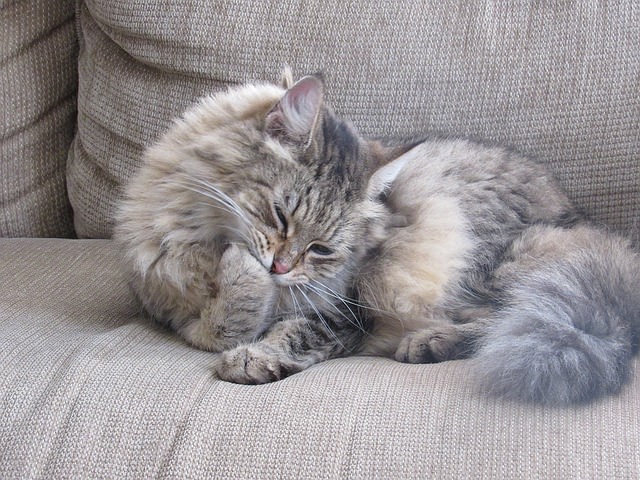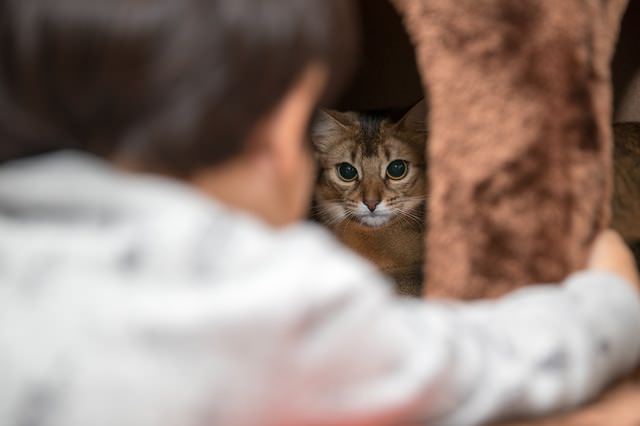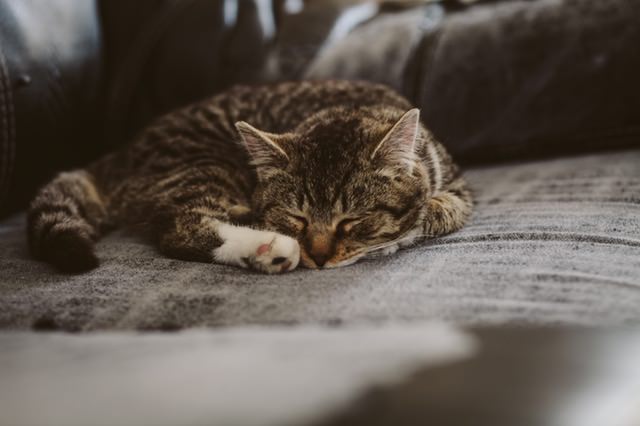Cats are very stoic animals and they hide their physical and emotional pain from us very well. Even the most intuitive cat owners might miss some warning signs from time to time. Sometimes, though, we just don’t know what to look for. Cats display symptoms of stress much differently than humans do, so we might be looking for the wrong signs. Stress can also be caused by many different variables, from anxiety to disease. Identify the symptoms of stress early on will help you start treating your cat’s discomfort as soon as possible. If you notice any of these signs, we recommended seeking veterinary attention right away.
#1 – Excessive Grooming
It’s normal for cats to groom themselves regularly, but sometimes they can get a little out of hand. If you notice your cat is licking and chewing so much that her hair is falling out and her skin is getting irritated, it might be a sign that something else is going on. Grooming is a calming behavior for cats, so the more they do it, the more stress they might be trying to relieve. Grooming to the extent of injury or inflammation will continue to get worse if left untreated, so it’s best to find out what’s bothering your cat.

#2 – Urinating Outside of the Litter Box
Even cats that have never had an accident might urinate outside of their litter box when under stress. If you notice your cat is having accidents, don’t get angry. First, look at what the underlying issue might be. Cats are creatures of habit, so even a small change in routine or location of the litter box might cause stress. Cats are not vindictive – they are not going to urinate anywhere because they are angry with us. They’re just trying to tell us something is upsetting them and showing us that we need to help them.
#3 – Aggression
Sudden aggression is almost always a sign that something is going on. Our cats can’t talk to us in our language, so they have to display stress and discomfort in ways that they know how. Aggression is a way for them to tell us that they are scared or in pain. Aggression can be caused by physical or emotional stress, so if you notice this change in your cat’s behavior it’s recommended to consult a veterinarian.

#4 – Isolation
Cats are independent and often have their favorite hiding places, but even the shyest cats usually come out to greet their families. If you notice your cat is hiding regularly or prefers to be in isolation when they were once very social, there might be something going on that’s upsetting them. Cats hide because they are frightened or in pain, so identifying the underlying cause is important to providing them a quality life again.
#5 – Lethargy
Just as you find yourself losing energy when you’re stressed out, your cat will do the same. Cats are known to nap a lot, but if you notice your cat sleeping a lot more than usual it could be cause for concern. Especially if you have a playful kitty that’s refusing to engage, you might want to make sure they are not experiencing any physical or emotional stress. Lethargy is a symptom for very many stressors, some very serious, so you don’t want to ignore it.

#6 – Loss of Appetite
A loss of appetite is one of the major give aways for stress. Whether your cat is stressed by their environment or has fallen ill, refusing food is a common sign your cat is uncomfortable. Cats should not fast often, so if you notice your cat is skipping meals you’ll want to get some nutrients in them right away. Making an appointment with your veterinarian will best determine the route of recovery, but it’s imperative that you don’t wait too long to get your cat eating again.

